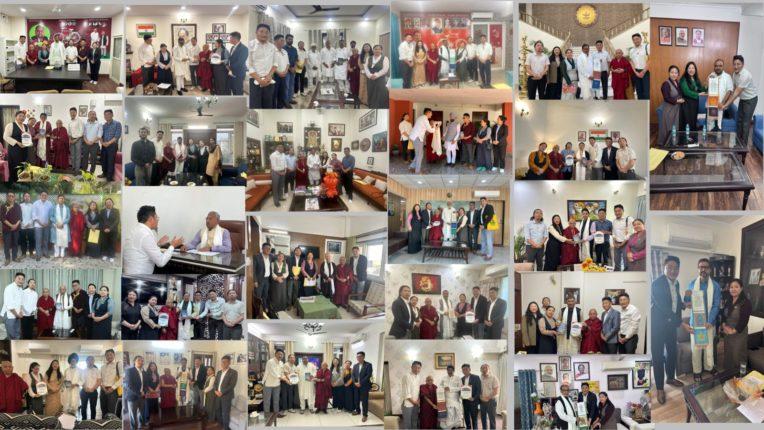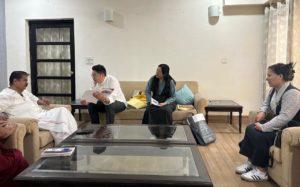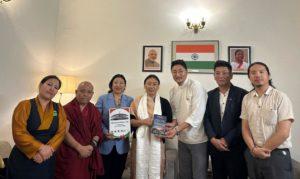
The Tibet Advocacy Alliance-India conducted its second advocacy campaign from March 17th to 28th, 2025, during the Indian Parliament’s budget session. The primary goal of this initiative is to advocate for the Indian government’s support in adopting resolutions that back the Tibetan cause and push for a concrete policy to resolve the Sino-Tibet conflict.

The alliance met with 56 members of parliament and dignitaries, including the former Chief Minister of Himachal Pradesh and the current Governor of Himachal Government. They provided updates on the critical situation inside Tibet to 44 members of parliament who are meeting for the first time, while 12 had been met during the first advocacy campaign. The advocacy representatives presented His Holiness’ latest book and wall hangings as gifts, along with a five-point appeal letter.
- Recognise Tibet as an occupied nation with a historically independent and sovereign past, and affirm the Indo-Tibet border. We urge you to make a statement in Parliament advocating continued support for the Tibetan people’s struggle for freedom, justice, and their right to self-determination.
- Honour His Holiness the 14th Dalai Lama, a global icon for peace and humanity, as he approaches his 90th birthday this year. Make a statement in the parliamentary session acknowledging His Holiness’s unparalleled contributions to global peace and the promotion of India’s ancient civilisational values. Urge the Government of India to publicly recognise and affirm support for Tibetan religious rights, including the Tibetan people’s right to determine the succession of the 14th Dalai Lama in accordance with Tibetan Buddhist tradition.
- Advocate for the protection of Tibetan culture and language. Call upon China to immediately abolish colonial boarding schools in Tibet, respect Tibetans’ right to practice their culture, and preserve the Tibetan language which has historic, undeniable links to India’s civilisational past.
- We urge you and India to halt further use of “Xizang” in all communication. Recent communications, including coverage of the January earthquake, refer to Tibet by the name “Xizang”. This is not only not an internationally recognised designation, but is a highly politicised term that the occupying Chinese government has attempted to promote internationally, against the wishes of Tibetans. The effect of using the name “Xizang” instead of “Tibet” is to endorse a proactive campaign by the Chinese government to colonise Tibet and systematically erase its culture and heritage.
- Recognise the strategic and ecological importance of Tibet and the Tibetan Plateau: acknowledging its unique biodiversity, its impact on regional weather patterns and its place at the heart of food and water security in Asia. Glacier meltdown across Tibet is disrupting downstream water supplies, threatening the sustainable livelihoods of Tibetan nomads, and putting at risk more than one billion downstream peoples and communities in south and east Asia.

The campaign achieved a significant milestone with 46 members of parliament signing a joint statement supporting His Holiness the Dalai Lama’s reincarnation rights and the cultural and religious rights of the Tibetans.
The advocacy group also submitted a letter to the Bhutanese embassy in New Delhi condemning Bhutan for succumbing to Chinese propaganda by referring to Tibet as “Xizang”.
The Tibet Advocacy Alliance-India aims to strengthen action on Tibet through coordinated advocacy efforts. Member groups include: Tibetan Youth Congress, Tibetan Women’s Association, National Democratic Party of Tibet, Students for a Free Tibet-India and International Tibet Network.
